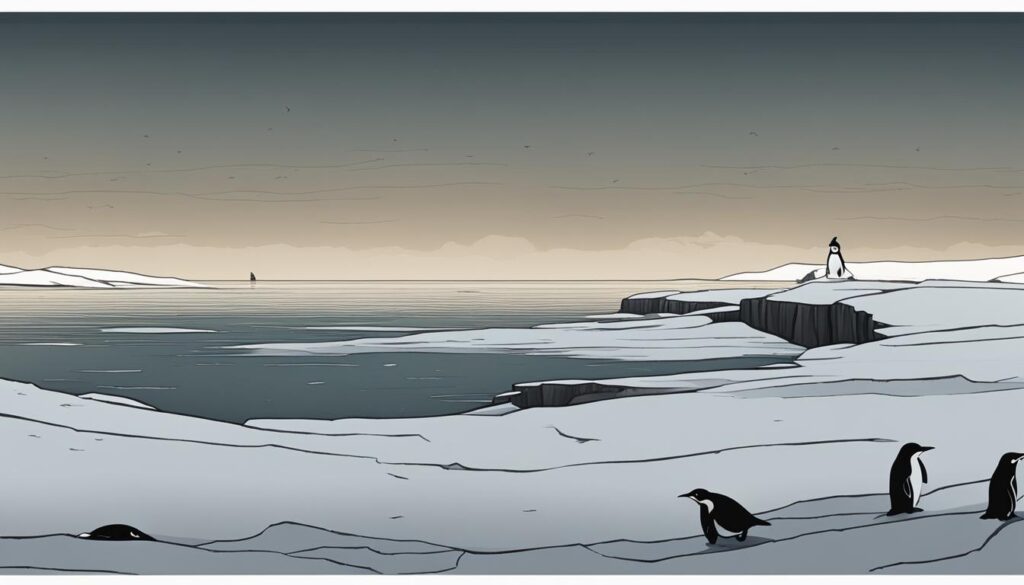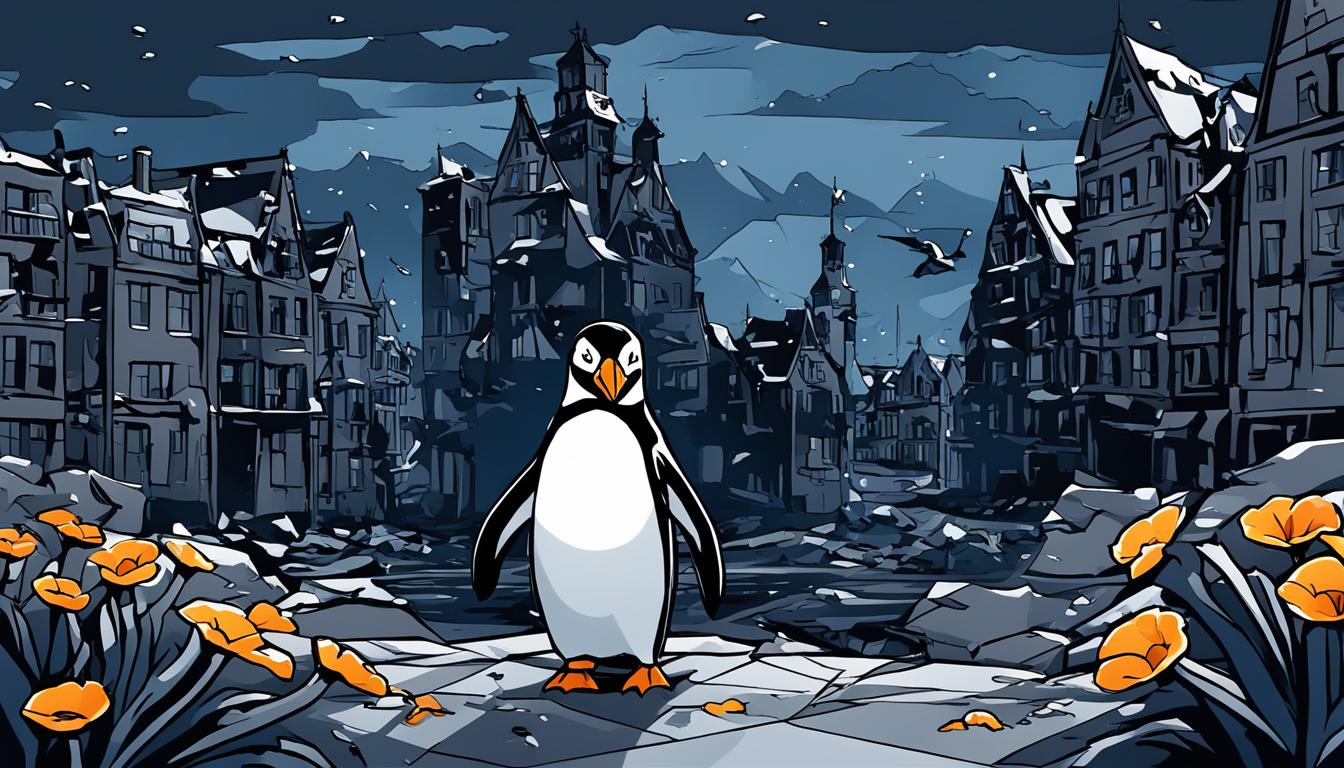Delve into the intriguing and slightly morbid world of Andrey Kurkov’s acclaimed novel, Death and the Penguin. This book summary offers a comprehensive overview of the story, exploring its complex themes, characters, and writing style.
As a darkly comic novel, Death and the Penguin offers a unique perspective on contemporary fiction, blending humor with serious contemplations of life and death. Follow the journey of Viktor, the protagonist, and his unusual companion, a pet penguin, as they grapple with isolation, mortality, and the human condition.
Through this book summary, gain valuable insights into Andrey Kurkov’s writing style and narrative approach, as well as the critical reception and influence of Death and the Penguin. Prepare to be transported to a world where nothing is quite as it seems, and where both tragedy and comedy are intertwined.
About the Author
Andrey Kurkov is a Ukrainian author born in St. Petersburg, Russia in 1961. He studied foreign languages at the Kiev Pedagogical Institute and worked as a journalist and screenwriter before becoming a full-time writer. Kurkov has published over 20 books, mostly in Russian and Ukrainian, and has gained international acclaim for his works, which are often characterized by their dark humor and satirical tone.
Kurkov’s own experiences, including his time spent living in Kiev during the turbulent years after the fall of the Soviet Union, have influenced his writing. His novels often explore themes such as corruption, isolation, and the human condition in the face of political upheaval.
According to Kurkov, writing is a way for him to make sense of the world around him and to understand the complexities of human nature. Through his work, he invites readers to join him on this journey of self-discovery.
Plot Overview
With Death and the Penguin, Kurkov creates a compelling narrative that combines elements of suspense, humor, and social commentary. The story follows Viktor Zolotaryov, a struggling writer who lives in a small apartment in Kiev with his beloved pet penguin Misha. When Viktor is offered a job writing obituaries for a local newspaper, he jumps at the opportunity, but soon discovers that his subjects are dying under mysterious circumstances.
The plot thickens as Viktor finds himself entangled in a dangerous web of criminal activity, involving hitmen, corrupt politicians, and an old friend from his military days. As he struggles to make sense of the chaos around him, Viktor must also navigate the complexities of his relationships, including his strained marriage and his deep connection to Misha the penguin.
Throughout the novel, Kurkov explores themes of mortality, morality, and the human desire for connection in a rapidly-changing world. Through Viktor’s journey, readers are challenged to confront their own beliefs about life, death, and the meaning of existence.
“In the end, Death and the Penguin is a complex meditation on life and death, love and loss, and the fundamental human experience of seeking meaning in an often senseless world.”
-The New York Times Book Review
Key Characters
Death and the Penguin features a cast of memorable characters, each uniquely contributing to the story’s intrigue.
Victor
Victor is the protagonist of the story, an unemployed writer who cares for a melancholic penguin named Misha. As the novel progresses, Victor becomes increasingly entangled in political corruption and crime.
Misha
Misha, the titular penguin, is more than just a pet to Victor – he’s a faithful companion and a source of comfort. Misha’s stoic presence provides a stark contrast to the chaos and violence that surrounds him throughout the novel.
Sergeant Major Kiril
Kiril is a corrupt military officer who becomes a client of Victor’s unique writing services. Kiril’s relationship with Victor is just one of his many nefarious dealings, as he is embroiled in dangerous criminal activity.
Yulia
Yulia is a love interest of Victor’s and a fellow writer. Her relationship with Victor is strained due to Victor’s involvement in criminal activity, though she ultimately seeks to help him overcome his troubles and move forward.
Themes and Symbolism

In Death and the Penguin, Andrey Kurkov explores several underlying themes throughout the narrative, using poignant symbolism to emphasize their significance. One of the most prominent themes is isolation, as seen in the characterization of Viktor, who is a disconnected and melancholic figure. The novel also explores mortality and how it affects different characters, particularly Viktor and Misha.
Kurkov employs symbolism to highlight these themes, such as the penguin, which can be interpreted as a reflection of Viktor’s internal struggle with isolation and mortality. The penguin is also a symbol of the human-animal connection, with its presence in Viktor’s apartment representing the intermingling of human and animal worlds.
“The penguin walked over to Viktor and leaned against his leg, like a cat. Viktor bent down and stroked its feathers, feeling grateful that the bird was incapable of conversation. It was already enough to have Misha to talk to.”
– Andrey Kurkov, Death and the Penguin
The symbolism in Death and the Penguin highlights the complexities of the human condition and the fragility of life. It allows readers to contemplate their own mortality and reflect on the importance of connection and relationships in a world that can often feel disconnected and isolating.
Writing Style and Tone
Andrey Kurkov’s writing style in Death and the Penguin can be described as understated yet impactful. He employs a darkly comedic tone that permeates the entire novel, balancing the stark reality of Viktor’s life with absurd, sometimes surreal situations. Kurkov’s prose is concise and straightforward, yet infused with wit and satire.
One of the ways in which Kurkov creates this tone is through his use of the titular penguin as a symbol. The penguin serves as a reminder of the absurdity of life, as well as a source of comic relief. Despite being a central character in the novel, the penguin is largely silent, underscoring the theme of isolation that permeates the novel.
Another key aspect of Kurkov’s writing style in Death and the Penguin is his skillful use of dialogue. The conversations between the characters are often banal, yet are imbued with an undercurrent of tension and unease. This serves to underscore the sense of uncertainty and danger that Viktor faces throughout the novel.
“Kurkov’s darkly comic writing style and understated tone make Death and the Penguin a thought-provoking and engaging read.”
Critical Reception
Since its release in 1996, Death and the Penguin has garnered widespread critical acclaim. The novel has been praised for its dark humor, satirical elements, and poignant exploration of themes such as mortality and isolation.
“A bitingly funny and provocative read that captures the absurdist nature of contemporary life.” – Los Angeles Times
The novel has also been commended for its compelling characters and engaging plot. Viktor’s relationship with Misha the penguin has been a particular point of interest for many readers and critics alike.
Overall, Death and the Penguin has received positive reviews and has been hailed as a modern classic of contemporary fiction.
Impact and Influence
Death and the Penguin is a novel that has had a significant impact on the literary landscape, both in its native Ukraine and around the world. The book has been widely praised for its unique blend of dark humor, satire, and existential themes, which have resonated with readers of all ages.
Andrey Kurkov’s novel has been credited with influencing a new generation of post-Soviet writers, who have embraced the author’s literary style and approach. Additionally, Death and the Penguin has been translated into numerous languages, further expanding its reach and influence.
One of the lasting effects of this novel has been its contribution to discussions on contemporary fiction. Death and the Penguin has brought attention to the need for fresh and innovative storytelling in a world that often depends on traditional narrative structures. Through the use of surrealism, black comedy, and political satire, Kurkov has established a new way of approaching the genre of literary fiction.
As a result of its impact, Death and the Penguin has received numerous literary awards, including the 2001 Best Foreign Book Award from the Independent Foreign Fiction Prize. It continues to be a highly revered and influential work of contemporary fiction that inspires and challenges readers and writers alike.
Conclusion
In conclusion, Death and the Penguin by Andrey Kurkov is a masterfully crafted darkly comic novel that leaves a lasting impression on readers. The book summary we have provided encapsulates the main themes and plot points of the novel, offering a glimpse into the unique world of Viktor and his penguin companion.
Andrey Kurkov’s writing style, filled with dark humor and satirical elements, adds a layer of complexity to the narrative, making Death and the Penguin a thought-provoking read. The symbolism present in the novel – exploring concepts such as mortality, isolation, and the human-animal connection – adds depth and meaning to the story.
Despite mixed reviews, Death and the Penguin has had a lasting impact on the literary world, sparking discussions on contemporary fiction and earning a place among the great works of literature. It is a must-read for any lover of dark comedy, satire, and thought-provoking storytelling.
FAQ
What is Death and the Penguin about?
Death and the Penguin is a darkly comic novel written by Andrey Kurkov. It follows the story of Viktor Zolotaryov, a struggling writer who becomes the caretaker of a penguin named Misha. As Viktor navigates through political corruption and the realities of post-Soviet Ukraine, he forms a unique and significant bond with the penguin.
Who is the author of Death and the Penguin?
Andrey Kurkov is the author of Death and the Penguin. He is a Ukrainian writer who gained international recognition for his unique and satirical writing style. Kurkov’s experiences living in post-Soviet Ukraine heavily influenced the themes and social commentary present in his works.
What are the key themes explored in Death and the Penguin?
Death and the Penguin delves into various themes such as isolation, mortality, identity, and the human-animal connection. Through its dark humor and satirical elements, the novel raises questions about the absurdities of life and the consequences of political and social decay.
How has Death and the Penguin been received by critics?
Death and the Penguin has received positive reviews from critics, who praise Andrey Kurkov’s unique writing style and the novel’s thought-provoking themes. The dark humor and satirical elements have been widely appreciated, and the book has been recognized as a significant contribution to contemporary fiction.
What is the writing style and tone of Death and the Penguin?
Andrey Kurkov’s writing style in Death and the Penguin is characterized by dark humor and a satirical tone. The author’s use of irony and wit adds depth to the narrative and allows him to explore complex themes in a lighthearted yet thought-provoking manner.
Who are the key characters in Death and the Penguin?
The key characters in Death and the Penguin include Viktor Zolotaryov, the protagonist and struggling writer, and Misha, the penguin he adopts. Other important characters include Arkady, Viktor’s friend, and various individuals Viktor encounters as he becomes entangled in political and criminal activities.
Has Death and the Penguin had any impact on literature?
Death and the Penguin has had a significant impact on literature, particularly in discussions surrounding contemporary fiction. The novel’s exploration of themes such as isolation and the human-animal connection has sparked critical and philosophical conversations. It has also established Andrey Kurkov as a prominent and influential writer in the literary world.



